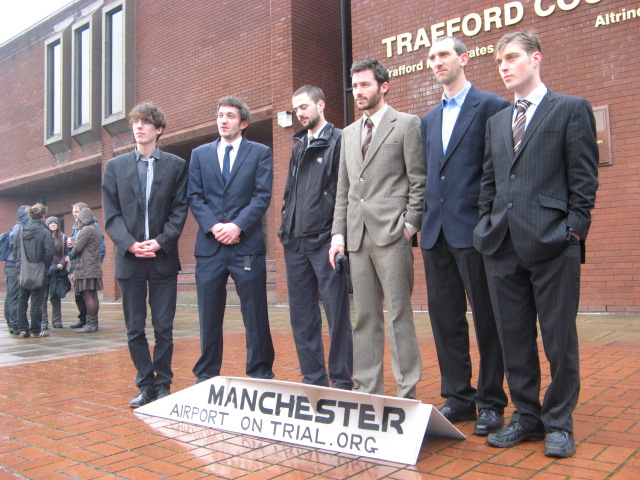Climate activists stand trial for Airport action
Article published: Tuesday, February 22nd 2011
Yesterday saw the opening of a trial of six climate activists for their part in an action which temporarily closed Manchester Airport last May. The group are all pleading not guilty. On the opening day of the trial at Trafford Magistrates the court heard from two expert witnesses who spoke of the imminent dangers of climate change.
The defendants – Robin Gillett, David Cullen, Barney Francis, Jess Bradley, Edward Watson and Iain Hilton – are charged with aggravated trespass. The facts of the case are not contested. However they are pleading not guilty on the grounds that their action was necessary to ‘prevent death and serious injury’ resulting from climate change directly contributed to by carbon emissions through aviation.
The court heard that on the morning of 24 May 2010 the group cut through a perimeter fence and positioned themselves around the nosewheel of a Monarch plane with 252 passengers on board bound for Egypt. Five of the defendants formed a “human chain” around the wheel by linking their arms together inside plastic tubing while a sixth was attached by a chain.
The disruption caused six flights to be diverted, as the airport closed for around 30 minutes. Costs of £1,500 were allegedly incurred by the airline’s decision to use additional fuel to keep to schedule, and repairs to the perimeter fence were estimated at £600.
Robin Gillett, 24, of Fallowfield was first defendant to speak. In cross-examination he spoke of the danger of climate change to human life, and the role played by emissions from Manchester Airport’s proposed expansion.
He said: “The World Health Organisation estimates that 150,000 people die each year due to the effects of climate change…[T]he expansion plans and the government’s [carbon] reduction targets are in contradiction with one another.”
Citing a decision by the High Court on 10 March 2010, which ruled out a third runway at Heathrow on the basis of the 2008 Climate Change Act, Gillett claimed that this invalidated expansion at Manchester. The court later heard that Manchester Airport and Manchester City Council gave no indication of taking this ruling into account prior to the group’s action.
The prosecution questioned Gillet’s stated aim, “to reduce carbon emissions,” suggesting that his real aim was to gain publicity.
Gillett detailed his prior engagement with “conventional” methods, which had proven “ineffective.” He claimed that “prohibitive costs” made a judicial review impossible, a claim the judge called into question. It also emerged that Mr Gillett had made “several attempts” to arrange a meeting with the then-Executive member for the Environment of Manchester City Council which were unsuccessful. Describing this process, he told the court that he “felt fobbed off. What else could I do?”
The second defendant, David Cullen, 31, of Manchester, argued that internationally governments were not in line to meet their target of meeting a two degree temperature rise. He told the court that he felt compelled to act in order “to intercede in an injustice,” but acknowledged that “you have to look carefully at the specific circumstances” when asked by the prosecution whether he would break the law in any situation in relation to the environment.
After he stated his intention to stop a plane and thereby reduce emissions, the prosecution pointed out that due to diversions more fuel was in fact burned. Asked whether he considered his action a failure, Mr Cullen replied: “No, I don’t take responsibility for being removed. I believe that if we had stayed there long enough…the flight would have been cancelled.”
In the afternoon session the court heard from two expert witnesses called by the defence.
In his written report submitted to the court Kevin Anderson, professor of Energy and Climate Change, University of Manchester, called for “urgent action” on climate change. When questioned on this in court he stated that “every day we are reducing the chance of living a reasonably liveable future.”
Anderson continued, “the impact of climate change is a result of the apathy of the last twenty years…The policy process…has failed to reach the [emissions reduction] targets set up for itself…[this] is a global problem. There are five to six billion of us so it is up to us all to get involved – that means everyone, people as well as politicians.”
Dr Geoffrey Meaden, retired professor of biology and geography at Canterbury College, described the likely effects of increases in global temperatures.
“A four degree rise [in average global temperatures] would be catastrophic from lots of points of view…around half of plant and animal species would become extinct and food production by agriculture would be negatively affected.”
Meaden described how locally areas in the Mersey drainage catchment area will see an increase in the frequency and severity of flooding due to climate change. Asked whether the defendants’ act of stopping the plane could have any effect, he replied: “Of course it would have an impact – in reducing the CO2 emitted. But it has a much bigger impact in the publicity it creates. If some people are brave enough to do this sort of thing, then they are bringing it to the public attention.”
When asked by the prosecution whether he would break the law to act against climate change, after pausing for a moment Dr Meaden replied: “Yes, I probably would.”
The trial continues today.
Michael Pooler
More: Environment, News
Comments
No comments found
The comments are closed.




